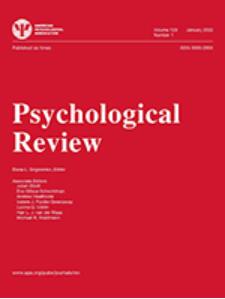作为(非)解释的机会:民间对机会和巧合理解的跨文化考察。
IF 5.8
1区 心理学
Q1 PSYCHOLOGY
引用次数: 0
摘要
因果解释是人类认知的一个重要组成部分。虽然我们拥有世界的某些因果模型,为一系列现象提供了令人满意的解释,但在处理世界的复杂性时,我们的认知能力有其局限性,使许多事件的原因难以捉摸。在这篇文章中,我综合了民族志和历史证据来表明,尽管我们对某些事件发生的原因理解有限,但纵观人类历史和不同社会,人们很少援引“机遇”——一个在当代和现代社会中变得非常重要的概念——作为解释。相反,他们经常提出假定的因果关系或假设的中介实体,如“运气”,来解释为什么特定事件在特定的时空背景下展开。我讨论了阻碍基于机会的解释发展的心理、认知和文化进化因素,并认为将机会概念化为可测量的东西,并随后将其作为一种合理的解释被接受,这在人类历史上出现得相对较晚,标志着一个关键的智力转变,对我们如何在日常生活中感知和管理不确定性有着深远的影响。(PsycInfo Database Record (c) 2025 APA,版权所有)。本文章由计算机程序翻译,如有差异,请以英文原文为准。
Chance as a (non)explanation: A cross-cultural examination of folk understanding of chance and coincidence.
Causal explanations are a key component of human cognition. While we possess certain causal models of the world that offer satisfactory explanations for a range of phenomena, our cognitive capacities have their limits when dealing with the complexities of the world, leaving the causes of many events elusive. In this article, I integrate ethnographic and historical evidence to show that, despite our limited understanding of why certain events occur, people throughout human history and across diverse societies have seldom invoked "chance"-a concept that has gained significant importance in contemporary, modern societies-as an explanation. Instead, they frequently propose putative causal relationships or posit intermediary entities such as "luck" to account for why specific events unfold within their particular spatial-temporal contexts. I discuss the psychological, cognitive, and cultural evolutionary factors that hinder the development of chance-based explanations and argue that the conceptualization of chance as something measurable and its subsequent acceptance as a legitimate explanation emerged relatively late in human history, marking a pivotal intellectual shift with profound implications on how we perceive and manage uncertainty in our daily lives. (PsycInfo Database Record (c) 2025 APA, all rights reserved).
求助全文
通过发布文献求助,成功后即可免费获取论文全文。
去求助
来源期刊

Psychological review
医学-心理学
CiteScore
9.70
自引率
5.60%
发文量
97
期刊介绍:
Psychological Review publishes articles that make important theoretical contributions to any area of scientific psychology, including systematic evaluation of alternative theories.
 求助内容:
求助内容: 应助结果提醒方式:
应助结果提醒方式:


